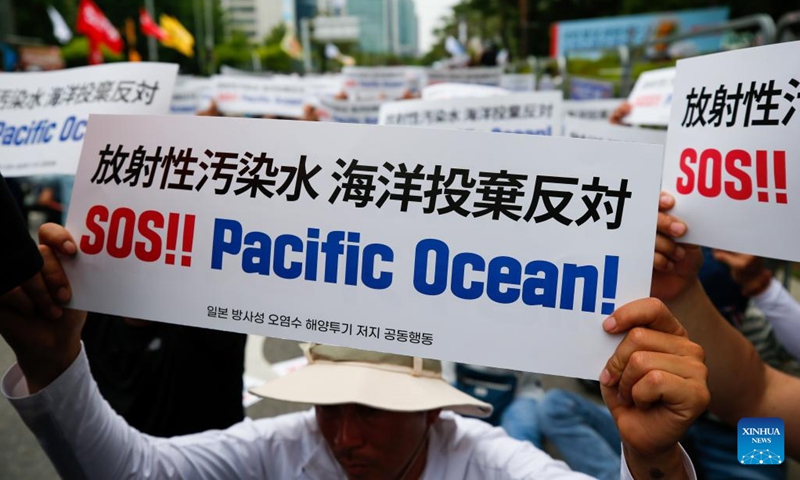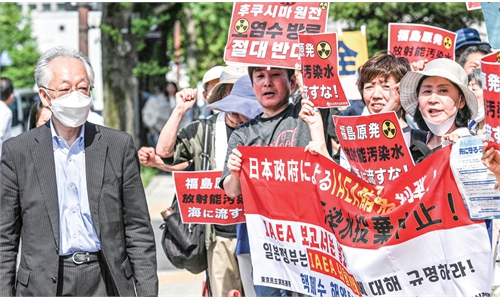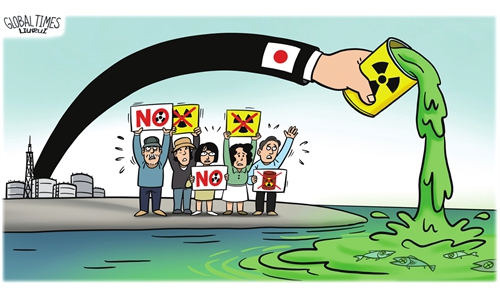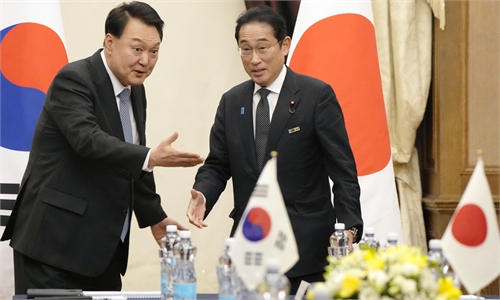Japan’s practice offering ‘compensation’ for its own citizens' silence will arouse more opposition voices: Chinese FM

People rally to protest against Japan's planned discharge of radioactive wastewater in Seoul, South Korea, June 12, 2023. Thousands of South Korean fishermen gathered on Monday near the parliamentary building in Seoul to clamor against Japan's planned discharge of radioactive wastewater from its crippled Fukushima Daiichi nuclear power plant into the Pacific Ocean(Photo: Xinhua)
Japan should face up to the legitimate concerns of all parties and different opinions of experts and discuss different approaches scientifically to deal with the nuclear-contaminated wastewater, fully communicating with its neighboring countries in a sincere manner, China's top diplomat Wang Yi said during a meeting at request with Yoshimasa Hayashi, Japan's Minister for Foreign Affairs, in Jakarta on Friday.
Wang, director of the Office of the Central Commission for Foreign Affairs, stressed that Japan's discharge plan concerns the safety of the marine environment and human life and health. The nature of the nuclear-contaminated wastewater produced by a nuclear accident is completely different from the wastewater produced by a nuclear power plant that's operating normally, said Wang.
There is no precedent case in the world, and there is no universally agreed standard, said Wang. Hayashi explained Japan's views on the issue of the discharge of Fukushima nuclear-contaminated wastewater and hoped that China would understand.
If there is no problem with the nuclear-contaminated wastewater dumped into the sea, how can the fishing industry in Fukushima be affected? If the Japanese government is not guilty, why does it use "compensation" to hush the relevant industry? This can only show that the dumping plan really has big problems, Wang Wenbin, spokesperson from the China's Ministry of Foreign Affairs, said at Friday's regular press briefing, in response to Japan's action to set up an 80-billion-yen ($574 million) fund to subsidize the fishing-related industry in Fukushima.
People in China, South Korea, Russia, Pacific islands countries, the Philippines, Indonesia, Peru and other Pacific rim countries are strongly opposed to Japan's dump plan, Wang noted. Regrettably, the Japanese government has ignored the opposition voices at home and abroad and has tried to silence its citizens by setting up a so-called "special fund," according to Wang.
Japan's practice exchanges "compensation" for its own citizens' silence, ignoring the safety and interests of its neighboring countries and Pacific islands countries. It will only trigger stronger doubts and opposition from the international community, the spokesperson said on Friday.
A spokesperson for the Chinese Embassy in Japan said on Thursday that Japan's move to provide subsidies to domestic fishing-related sectors is clearly an offer of "hush money" to keep the industry quiet.
China urges Japan to immediately stop the discharge plan, and consult with all stakeholders and the international community, and to dispose of the nuclear-contaminated wastewater in a scientific, transparent and safe manner, the spokesperson noted.
Japan's discharge plan has caused concern and outrage in the international community.
More than 80 percent of respondents in 11 countries in the Asia-Pacific region, except for Japan, said Japan's plan of dumping nuclear-contaminated wastewater into the sea is "irresponsible" and nearly 90 percent of respondents showed negative sentiments toward the plan, and 94 percent of them said the move will have a negative effect not only on Japan and Pacific rim countries but also the whole world, a survey conducted by the Global Times Research Center found.
Global Times



